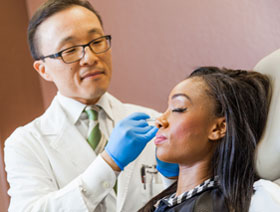 “You are what you eat” or so they say. One thing is for sure: your diet can have an impact on your skin. If you have a skin condition, you may have noticed that certain foods aggravate it. Even if you have normal skin, a healthy diet can protect you from premature aging and help keep skin looking great through the years. Today we are going to take a walk through the grocery aisles to look at common foods and how they affect your skin, for better or worse.
“You are what you eat” or so they say. One thing is for sure: your diet can have an impact on your skin. If you have a skin condition, you may have noticed that certain foods aggravate it. Even if you have normal skin, a healthy diet can protect you from premature aging and help keep skin looking great through the years. Today we are going to take a walk through the grocery aisles to look at common foods and how they affect your skin, for better or worse.
Alcohol.
While a glass of wine or other alcoholic beverage here and there isn’t a problem, consuming excess alcohol isn’t good for your skin (or your liver, for that matter). Alcohol is dehydrating to the body, and maintaining good hydration is key to healthy skin. Dehydrated skin can feel dry and look dull. Skin tone suffers and fine lines are more noticeable. To rehydrate skin, drink plenty of water. Hydration works best from inside.
Carrots.
The beta carotene in carrots has been found to decrease oil production in the skin and may even have a beneficial effect on psoriasis. Your body converts beta-carotene into Vitamin A (the main active ingredient in Retin-A, an anti-acne medication). Carrots are also rich in Vitamin C, which not only improves collagen production but also serves as a powerful antioxidant to protect skin sun damage and environmental pollutants.
Chocolate.
Chocolate is good for your skin, but only if it’s dark. The potent flavonols found in 70 percent or higher concentrations of cacao have skin-firming properties and also reduce inflammation. Don’t overindulge, though. Not all dark chocolate is alike and you’ll want to avoid anything with a high sugar content (keep reading to see why).
Gluten.
Gluten has been known to cause skin reactions in people who have a sensitivity to it, including an itchy, blistering rash called dermatitis herpetiformis.
Because gluten can have an inflammatory effect, it may cause other skin conditions to flare up.
Milk.
Many people with acne notice worse outbreaks when they consume milk or other dairy products. This may be because milk contains a form of sugar known as lactose, which (like all sugars) has a high glycemic index, raising insulin levels and possibly contributing to acne flare ups. Nut milks like almond milk, contain Omega-3s, which have anti-inflammatory properties, making them a skin-friendly alternative to cow’s milk. On the plus side, if you are able to tolerate milk, it’s a good way to get a dose of Vitamin D without exposing yourself to damaging sun rays.
Salmon.
Salmon is good for skin. This popular fish provides a healthy dose of the free fatty acids that your body cannot produce. These long-chain hydrocarbons serve as building blocks for healthy skin cells, help reinforce skin’s protective barrier, and hold moisture in. Salmon is high in Vitamin D as well.
Sunflower oil.
Sunflower oil is high in linoleic acid, an essential building block for ceramides, which are one of skin’s natural moisturizers. It strengthens the skin’s barrier, holding in moisture and keeping out pollution. Sunflower oil may also reduce cellular inflammation, which is associated with aging.
Sugar.
You already know it isn’t good for you, but did you know that sugar consumption also contributes to premature aging? On a molecular level, sugar reacts with proteins in a negative fashion through a process called glycation, leading to impaired elasticity of tissues in the skin, which translates into dreaded lines and wrinkles.
Tomatoes.
The gem hiding inside tomatoes is called lycopene, a potent antioxidant that has been shown to protect skin from ultraviolet damage, including sunburn. Lycopene is the plant nutrient that gives red and pink fruits and vegetables their color, so it can also be found in things like watermelon and pink grapefruit. The highest levels of lycopene are found in processed tomato products like tomato paste. Spaghetti, anyone?
While your diet can help keep your skin healthy, clear and youthful, if nutrition alone isn’t giving you the skin you want, come see one of our board-certified dermatologists. We can help.


